3 Powerful Performance Metrics Every Employee Should Track (How GetCredible Helps)

Performance metrics in the workplace play a crucial role, blending accountability with recognition and guiding managerial decisions with precise data. These metrics not only pinpoint training needs and opportunities for improvement but also elevate employee engagement by aligning personal achievements with broader company objectives.
Adopting performance metrics is critical to enhancing both individual and organizational growth, fostering a culture of continuous improvement in overall performance management.
Let’s understand why they are important with some significant statistical information:
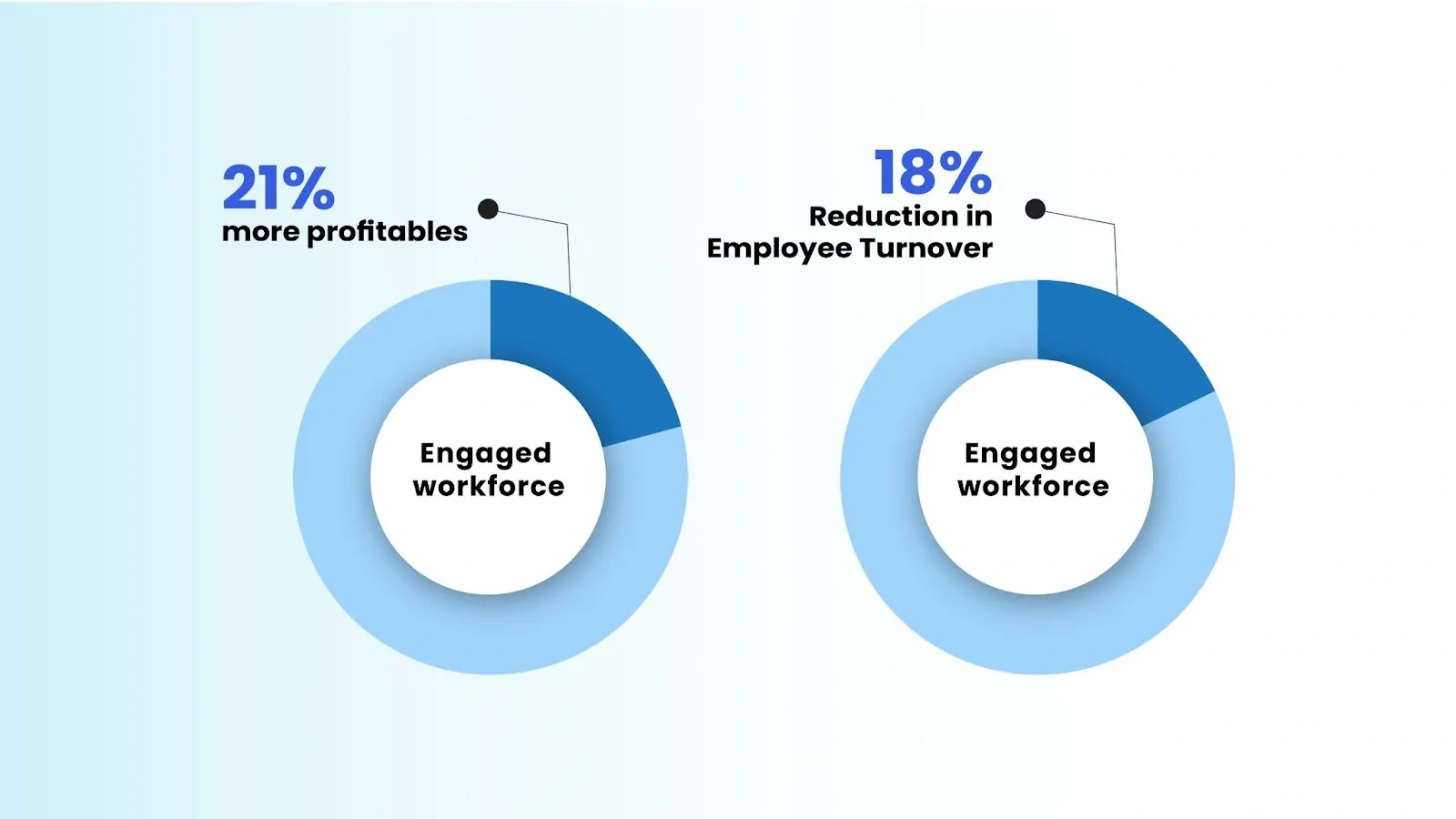
- Highly engaged workforces are 21% more profitable than their less engaged counterparts.
- Companies that actively engage their employees experience an 18% reduction in staff turnover.
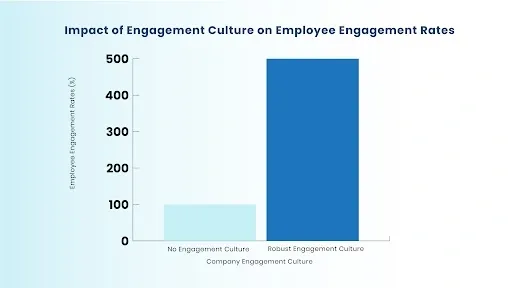
- Companies with a robust engagement culture not only see higher profitability but also enjoy a 400% increase in employee engagement rates when they foster a good culture and working environment.
Employee engagement directly impacts the relevance of performance metrics by enhancing productivity, quality, and overall workplace morale. When employees are engaged, they are more likely to meet and exceed performance benchmarks, providing clear and actionable data that help organizations tailor growth strategies. Essentially, engaged employees not only contribute positively but also provide valuable insights through metrics that drive organizational success.
There are three types of performance metrics:
- Productivity Metrics
- Quality of Work Metrics
- Collaboration and Team Contribution Metrics
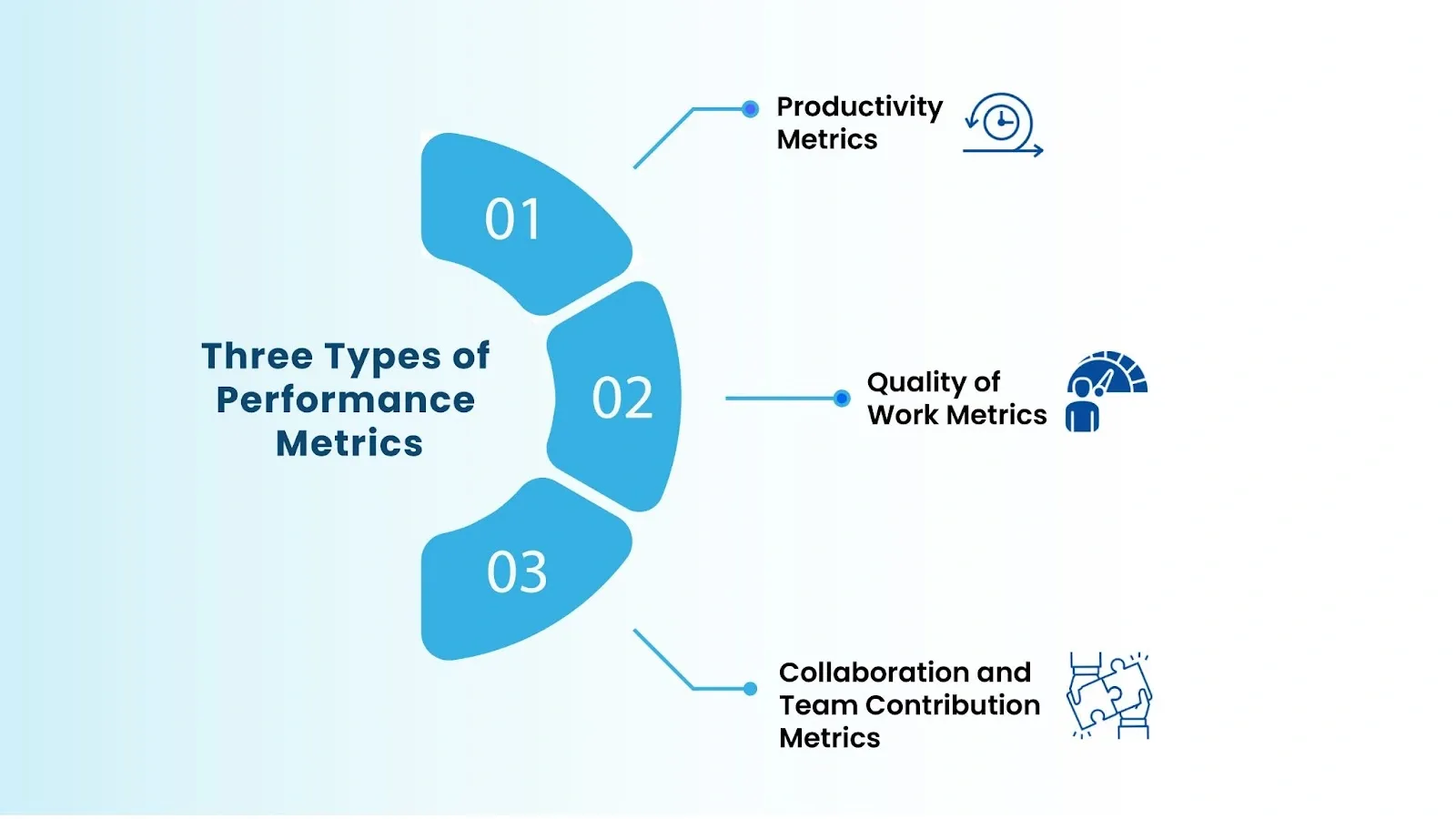
In this blog, let’s explore three robust performance metrics and how they impact employee performance and overall productivity.
Section 1: Productivity Metrics
Key Productivity Metrics
When assessing performance metrics for professionals, focusing on key indicators is crucial for a comprehensive understanding of their productivity and effectiveness:
- Output Quality and Quantity: This measures the volume and quality of work produced, which is essential for assessing customer satisfaction and business reputation.
- Efficiency: Evaluate how well professionals use resources to achieve outcomes, identifying potential areas for process improvement.
- Goal Achievement: Tracks how effectively professionals meet predefined objectives, aligning individual performance with strategic business goals.
- Competency and Skill Utilization: This assessment of the application of skills in professional roles is crucial for identifying training needs and planning career development.
- Innovation and Problem Solving: Monitors the ability to propose new ideas and solve complex problems, highlighting contributions to the company’s competitive edge.
- Time Management: Gauges efficiency in managing workload and meeting deadlines, important for optimizing productivity and workload distribution.
These performance metrics for professionals are integral to enhancing individual and organizational success by providing actionable insights into areas for improvement and alignment with overall goals.
Measuring Productivity for Career Growth
Productivity metrics provide a structured approach to assessing an individual's contributions and progress within an organization. Here’s why they are so important:
- Objective Assessment: Performance metrics for professionals offer an objective basis for evaluating employee contributions. By quantifying output, quality, and efficiency, these metrics ensure that evaluations are based on concrete data rather than subjective opinions, fostering fairness in the workplace.
- Identifying Strengths and Weaknesses: Regular use of performance metrics for professionals helps identify areas where an employee excels and areas needing improvement. This information is crucial for tailoring personal development programs that enhance a professional’s skills in specific areas, thereby supporting their career growth.
- Motivation and Engagement: Implementing performance metrics can significantly boost motivation among professionals. When employees understand how their productivity is measured and see a clear connection between their efforts and their career progression, they are more likely to be engaged and strive for excellence.
- Goal Setting and Career Planning: Performance metrics provide professionals with clear benchmarks for which to aim. This is particularly useful for setting realistic and challenging goals that encourage professional development and career advancement.
- Reward and Recognition: Performance metrics are often used to determine eligibility for promotions, raises, and other forms of recognition for professionals. By clearly demonstrating their productivity and impact, professionals can use these metrics to argue for career advancements and rewards.
- Performance Improvement: By continuously measuring productivity, organizations can offer timely feedback to professionals, allowing them to adjust their strategies and improve their performance. This ongoing process not only helps individuals to grow professionally but also enhances the overall productivity of the organization.
Section 2: Quality of Work Metrics
Key Quality Metrics
- Error Rates: This performance metric assesses the frequency of mistakes in a professional's work, with a lower error rate indicating higher accuracy and proficiency.
- Client Feedback: Client feedback measures satisfaction levels with the service provided, impacts future engagement, and highlights areas for improvement.
- Compliance with Industry Standards: This metric verifies whether a professional's work aligns with regulatory and quality standards, which is crucial for maintaining trust and credibility in their field.
Impact of quality metrics on professional reputation and job security
Several key factors influence the impact of quality metrics on professional reputation and job security:
- Industry Standards: Quality expectations vary across industries. For example, healthcare prioritizes patient outcomes, whereas software development focuses on code efficiency. Professionals need to align with these standards to boost their reputation and job security.
- Organizational Culture: Companies that emphasize quality in their core values place significant weight on quality metrics during performance evaluations, directly affecting career advancement and stability.
- Performance Evaluation Systems: Transparent and comprehensive evaluation systems that focus on quality can reinforce its importance, influencing career decisions like promotions and job continuity.
- Managerial Emphasis: Managers' focus on quality impacts its relevance to a professional's career. Managers who reward high-quality work and provide feedback make quality a key factor in job security and reputation.
- Peer Influence and Team Dynamics: In teams that uphold high-quality standards, individual members are motivated to meet or exceed these norms, enhancing their professional standing and reliability.
- Training Opportunities: Access to ongoing training helps professionals meet current quality standards, improving their work quality, reputation, and job security.
These factors collectively shape how quality metrics influence professional outcomes, guiding individuals and organizations in their strategic focus.
Section 3: Collaboration and Team Contribution Metrics
Key Teamwork Metrics
- Contributions to Team Goals: This metric evaluates how well an individual's efforts align with and advance the team's overall objectives, reflecting their ability to collaborate effectively.
- Leadership Roles: Assessing leadership involves looking at how individuals guide team efforts, make decisions, and motivate colleagues, regardless of formal authority.
- Support Provided to Colleagues: This performance metric measures the extent to which professionals offer mentorship, share knowledge, and provide feedback to enhance team cohesion and effectiveness.
How Value of Teamwork Affects Performance Evaluation
Teamwork holds immense value in most professional settings, profoundly influencing performance evaluations. Here’s how it plays a crucial role:
- Enhanced Problem Solving: Teamwork allows for diverse perspectives to come together, facilitating more creative and effective solutions. This collaborative approach is often reflected in performance metrics for professionals, where problem-solving abilities are a key indicator of a team's efficiency and innovation.
- Increased Productivity: When professionals work collaboratively, they tend to complete tasks more efficiently and effectively. Performance evaluations often highlight how well individuals contribute to team productivity, emphasizing the importance of teamwork in achieving higher output and meeting organizational goals.
- Improved Learning and Skill Development: Teamwork encourages continuous learning and skill exchange among team members. Performance metrics for professionals often include assessments of how individuals have grown their capabilities through team interactions, which is vital for career advancement and personal development.
- Better Communication and Morale: Effective teamwork enhances communication and boosts morale, creating a more positive work environment. This improvement in workplace culture is typically reflected in performance evaluations, where strong communicative skills and a positive attitude in team settings are highly valued.
- Accountability and Support: Teamwork fosters a sense of accountability and support among members, where each individual's performance impacts the group's success. Performance metrics for professionals frequently measure how individuals uphold their responsibilities and support their colleagues, which is crucial for maintaining high standards and a supportive workplace.
Since you understand the importance of tracking your performance and showcasing your achievement, you can get help from some great online tools available in the market. One such flexible and effective tool is getCREIDBLE. Let’s see how.
Leveraging getCREDIBLE to Showcase Professional Achievements and Skills
getCREDIBLE provides a comprehensive platform for employees to record, showcase, and highlight their professional achievements and skills effectively. Here's how it can be utilized across different aspects of an employee's career:
- Documenting Productivity Achievements: getCREDIBLE allows employees to maintain a detailed record of their productivity achievements, which can be presented to managers or included in professional portfolios. This feature helps employees track their progress and showcase their contributions during performance reviews or career advancements.
For this, you can use getCREDIBLE’s Rating system, which shows a graph based on your milestones and feedback posted.
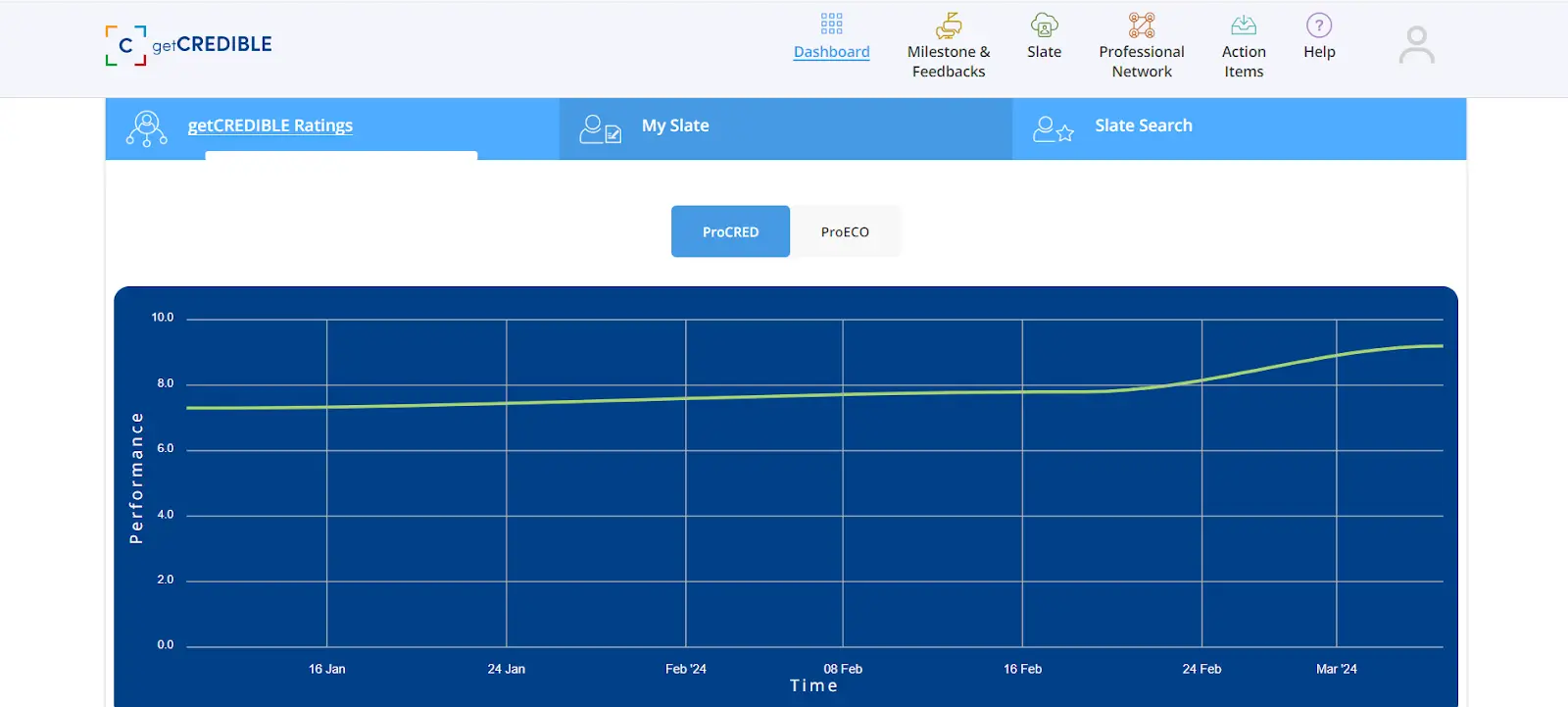
- Highlighting Quality Achievements and Feedback: The platform enables employees to highlight recognized quality achievements and incorporate positive feedback from clients or peers. This aspect of getCREDIBLE is particularly beneficial for building a robust professional profile that reflects credibility and expertise, helping employees stand out in their field.
For this, you can use getCREDIBLE’s milestone and feedback feature to post your quality achievements and get positive feedback from your clients and project members.
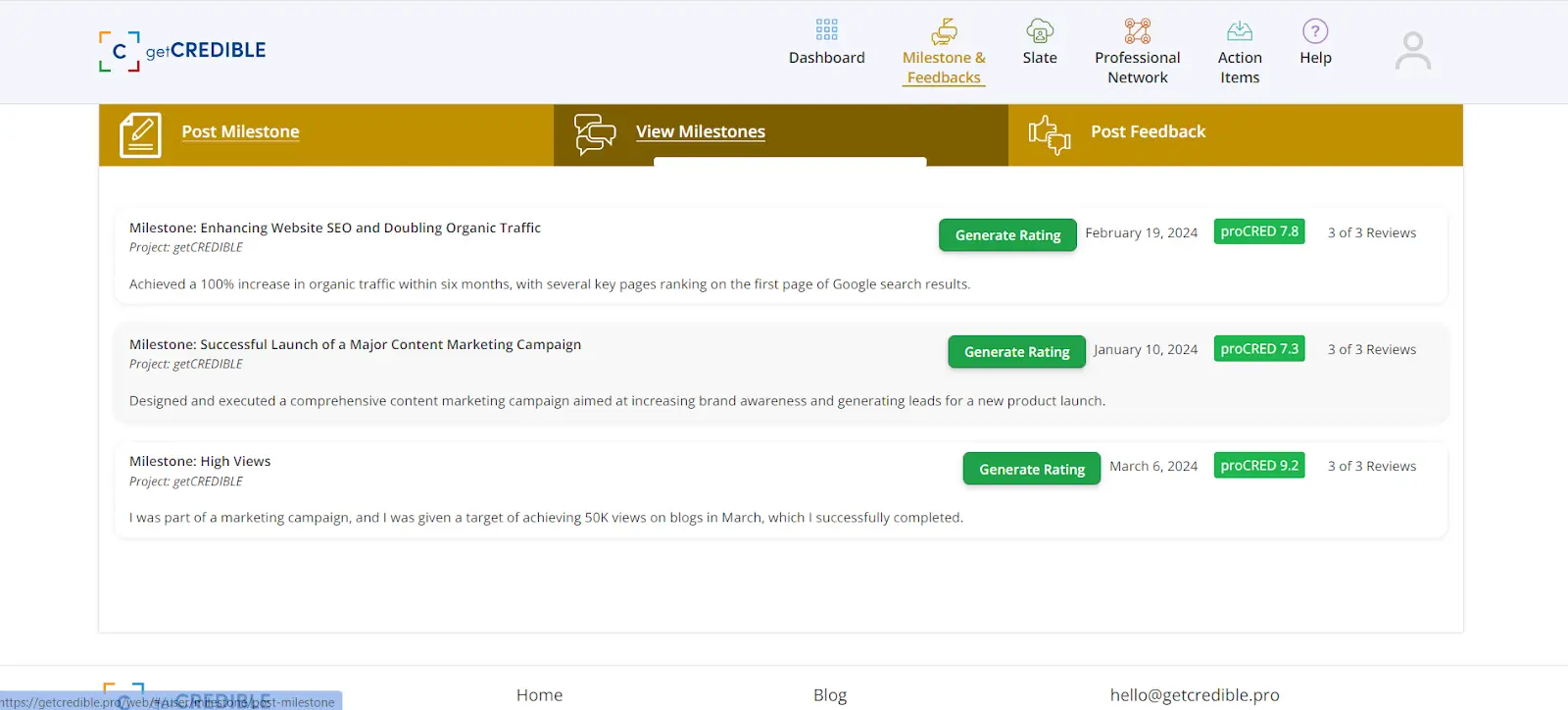
- Displaying Teamwork and Leadership Skills: getCREDIBLE offers tools for employees to document their roles and contributions in team settings, including any leadership roles undertaken. This functionality makes it easier for employees to demonstrate their teamwork and leadership capabilities to superiors, thereby aiding in career development and opportunities for advancement.
By using getCREDIBLE, employees can ensure that their hard work and contributions are meticulously documented and accessible, providing a solid foundation for career growth and recognition in their professional journeys.
Conclusion
Powerful performance metrics are pivotal in today's professional arena. A detailed display of your achievements and capabilities through performance metrics helps establish a credible image, makes a strong impression on potential employers, and ensures alignment with the expectations of your desired role.
Performance metrics clearly outline your professional accomplishments and career goals, ensuring they resonate with the requirements of the positions you are targeting. Platforms like getCREDIBLE are essential for showcasing your credentials, skills, and achievements in a manner that is both accessible and appealing to potential employers or supervisors.
To leverage these innovative features and enhance your professional presentation, consider registering with getCREDIBLE today.
Frequently asked questions
- What are the best performance metrics?
- The best performance metrics vary by industry but often include:
- Revenue Growth - Indicates business success.
- Customer Satisfaction - Reflects client happiness.
- Net Profit Margin - Measures profitability.
- Employee Productivity - Assesses workforce efficiency.
- Customer Retention Rate - Shows customer loyalty.
- Benefits of Tracking Performance Metrics
- Improved Decision Making - Data-driven choices.
- Enhanced Efficiency - Identifies areas for improvement.
- Goal Alignment - Keeps teams focused.
- Increased Accountability - Tracks individual contributions.
- Competitive Advantage - Informs strategic planning.
